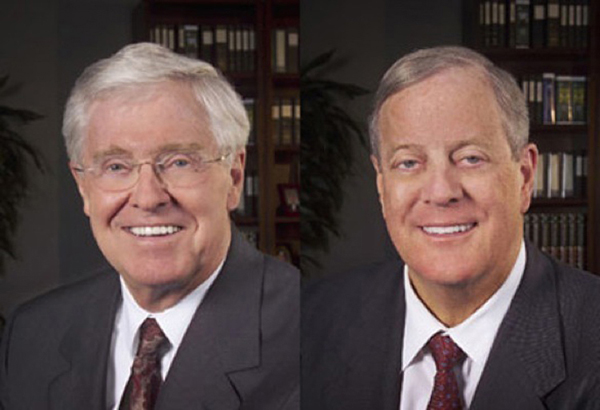 Billionaire brothers Charles and David Koch of Koch Industries, the second largest privately-held energy company in America, have poured millions of dollars into creating a web of media influence to increase their power to sow doubt about climate change among the American public. A network of bloggers, pundits, think tanks and foundations get funding from the Kochs, including the Competitive Enterprise Institute, which has received over $700,000, and the libertarian Cato Institute, which has received $13 million from the Kochs since 1998. The Manhattan Institute received $1.5 million, Americans for Prosperity has gotten $5.5 million, the Pacific Research Institute has gotten $1.2 million and the Federalist Society $2 million. This web of think tanks and foundations operates blogs and Web sites and house prominent writers who pump out climate denial writings that help spread the Kochs' anti-climate change ideology. The Kochs' influence isn't limited to fringe media, either. Syndicated columnist Charles Krauthammer, who writes for the Weekly Standard and the Washington Post, Philip Anshutz, owner of the Examiner newspapers and the Weekly Standard, Stephen Moore, a Wall Street Journal editorial board member, are just some of the conservative media figures who attend the Kochs' exclusive, private annual gatherings.
Billionaire brothers Charles and David Koch of Koch Industries, the second largest privately-held energy company in America, have poured millions of dollars into creating a web of media influence to increase their power to sow doubt about climate change among the American public. A network of bloggers, pundits, think tanks and foundations get funding from the Kochs, including the Competitive Enterprise Institute, which has received over $700,000, and the libertarian Cato Institute, which has received $13 million from the Kochs since 1998. The Manhattan Institute received $1.5 million, Americans for Prosperity has gotten $5.5 million, the Pacific Research Institute has gotten $1.2 million and the Federalist Society $2 million. This web of think tanks and foundations operates blogs and Web sites and house prominent writers who pump out climate denial writings that help spread the Kochs' anti-climate change ideology. The Kochs' influence isn't limited to fringe media, either. Syndicated columnist Charles Krauthammer, who writes for the Weekly Standard and the Washington Post, Philip Anshutz, owner of the Examiner newspapers and the Weekly Standard, Stephen Moore, a Wall Street Journal editorial board member, are just some of the conservative media figures who attend the Kochs' exclusive, private annual gatherings.

 Billionaire brothers
Billionaire brothers  As former President
As former President